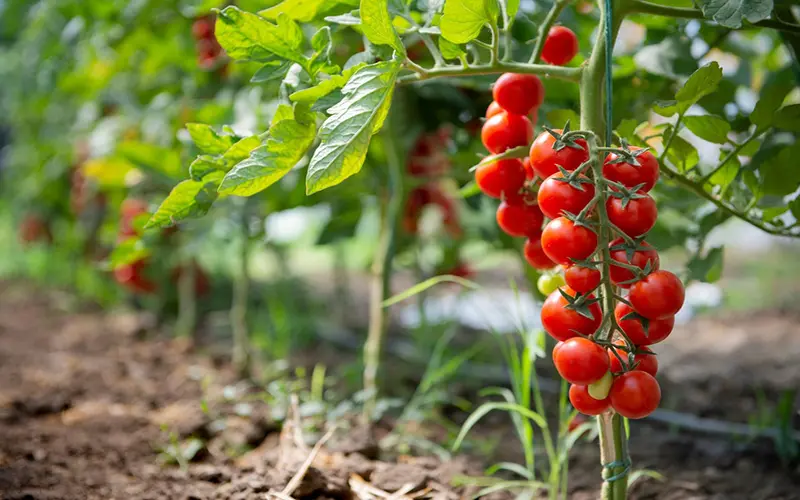Tomatoes are one of the most popular and rewarding crops to grow in home gardens. Whether you are a seasoned gardener or a beginner, achieving the best tomato yield requires attention to various factors, including soil health, watering, and, most importantly, the right type of fertilizer.
Fertilizing your tomato plants properly ensures they have the nutrients needed for optimal growth, robust fruit production, and resistance to diseases.
But with so many fertilizers available, choosing the right one can be a bit overwhelming. In this article, we will discuss the best fertilizers for tomatoes, their benefits, and how to apply them.
Types of Fertilizers for Tomatoes
Tomatoes require three primary nutrients: nitrogen (N), phosphorus (P), and potassium (K). These are the macronutrients that fuel healthy plant growth. A balanced fertilizer, often labeled with an N-P-K ratio, can provide these essential nutrients. However, tomatoes also benefit from micronutrients like calcium, magnesium, and sulfur, which help prevent specific issues like blossom end rot and enhance fruit flavor.
Recommended Products: CK NPK Complex Fertilizers
1. Organic Fertilizers
Organic fertilizers are derived from natural sources such as compost, manure, or bone meal. These fertilizers slowly release nutrients into the soil, promoting long-term soil health. They are ideal for gardeners looking to grow healthy, chemical-free tomatoes. Some of the best organic fertilizers for tomatoes include:
Compost:
Rich in nutrients and microorganisms, compost improves soil structure and fertility.
Fish emulsion:
A high-nitrogen organic fertilizer that encourages leafy growth.
Bone meal:
High in phosphorus, which supports root development and flowering.
2. Synthetic Fertilizers
Synthetic fertilizers, often in granular or liquid form, provide a quick and concentrated source of nutrients for tomatoes. These fertilizers are typically more affordable and easier to apply than organic options. The N-P-K ratio for tomatoes is often in the range of 10-10-10, 5-10-10, or 3-4-6. Some of the best synthetic fertilizers for tomatoes include:
Miracle-Gro Water Soluble Tomato Plant Food:
This fertilizer is specially formulated for tomatoes and provides balanced nutrients for vigorous growth.
Jobes Organic Tomato and Vegetable Fertilizer:
A slow-release, organic option that delivers a balanced mix of nutrients.
3. Slow-Release Fertilizers
Slow-release fertilizers are designed to release nutrients over an extended period. They are ideal for tomatoes as they provide consistent nourishment throughout the growing season. These fertilizers are easy to use and reduce the frequency of applications. Some well-known slow-release fertilizers include:
Osmocote Smart-Release Flower & Vegetable Plant Food:
A well-balanced formula that ensures tomatoes receive steady nutrients.
How to Apply Fertilizer for Tomatoes
To get the best results from your tomato fertilizer, timing and application methods matter. Here are some tips:
Pre-planting: Before planting your tomatoes, mix a slow-release fertilizer or compost into the soil to enrich it.
During Growth:
Apply a balanced fertilizer about every 3-4 weeks during the growing season. Liquid fertilizers can be applied more frequently, but follow the instructions on the label.
Blossom End Rot Prevention:
If you notice black spots at the bottom of your tomatoes, it may be due to a calcium deficiency. Adding a calcium-rich fertilizer or crushed eggshells to the soil can help prevent this condition.
For further reading, check out : Affordable Fertilizers for Small Farms
Conclusion
Choosing the best fertilizer for tomatoes depends on your gardening goals, whether you prefer organic or synthetic options, and your specific soil needs.
Both organic and synthetic fertilizers can work well, but organic options may provide longer-term benefits for soil health.
Its essential to feed your tomatoes with the right nutrients at the right time to maximize yield and produce the healthiest fruits possible.
FAQs
1. How often should I fertilize my tomato plants?
It is recommended to fertilize tomatoes every 3-4 weeks during the growing season. If using a slow-release fertilizer, it may only need to be applied once or twice per season. For liquid fertilizers, follow the label instructions for frequency.
2. Can I use too much fertilizer on my tomatoes?
Yes, over-fertilizing can harm your tomatoes, leading to excessive foliage growth at the expense of fruit production. It can also cause nutrient imbalances in the soil. Always follow the recommended dosage and avoid applying too frequently.
3. What are the signs of nutrient deficiencies in tomato plants?
Common signs include yellowing leaves (nitrogen deficiency), poor root development (phosphorus deficiency), and brown, sunken spots on the bottom of fruits (calcium deficiency). Adjusting the fertilizer or adding specific nutrients can correct these issues.
It is recommended to fertilize tomatoes every 3-4 weeks during the growing season. If using a slow-release fertilizer, it may only need to be applied once or twice per season. For liquid fertilizers, follow the label instructions for frequency.
Yes, over-fertilizing can harm your tomatoes, leading to excessive foliage growth at the expense of fruit production. It can also cause nutrient imbalances in the soil. Always follow the recommended dosage and avoid applying too frequently.
Common signs include yellowing leaves (nitrogen deficiency), poor root development (phosphorus deficiency), and brown, sunken spots on the bottom of fruits (calcium deficiency). Adjusting the fertilizer or adding specific nutrients can correct these issues.
